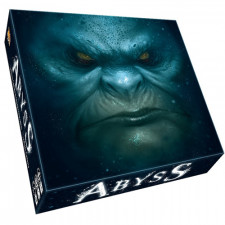Abyss Review
on May 5, 2015
Some games find one thing they are good at and mine it for all it’s worth, while others take a little bit of everything and come up with something else entirely. Abyss feels like the latter, but unlike other “bits of everything†designs it is not a complex game. Rather it veers close to a lot of different ideas without ever fully embracing any of them. The result is a good game without any obvious design flaws, but also one that is lifted up by a surprising and distinctive setting.
The players are citizens of an undersea kingdom, each trying to accumulate the most glory/honor/victory points to become the new ruler of the sea. You do this by accumulating allies from among the undersea creatures. These will allow you to curry the favor of the lords of the abyss. The lords themselves do all sorts of things ranging from bringing extra income to allowing you to grab more allies to directly affecting what the other players. If you get the right combination of lords you can gain control of a special undersea realm, amounting to extra points at the end of the game. The lords used to gain control of this realm lose their powers, meaning they will be good for endgame points but not much else. Once someone has enough lords, the player with the most points is crowned the new ruler of Abyss.
There are a lot of familiar mechanics here, though they tend to be tweaked to make them more accessible or to integrate them into the rest of the design. You gain allies through a draft system, and your collection of lords feels a lot like a tableau created in something like 7 Wonders or Race for the Galaxy. There are also some understated push-your-luck elements, in the form of a monster that can show up while you search for allies. If you choose to fight him you get a reward, but if you leave it the reward gets bigger for the next person who encounters it. Because the setting is mostly so much fluff, I initially had a little trouble understanding how everything flowed together. There is a disconnect when you interrupt finding allies to maybe fight a monster or when you turn in your lords to gain control of a land. Once I sidestepped a thematically-focused point of view, it all began to flow much better. I was actually surprised at how well I was able to explain it despite these lapses of logic.
I guess that means that Abyss can be branded with the ultimate scarlet letter, the “A†for “abstract.†That’s a fair assessment, but it sells short the way these different elements are integrated with each other even if they aren’t integrated so well with the setting. There are also some great touches that I haven’t seen elsewhere, like the way new allies are purchased. The active player flips one face up, but all of the other players get right of first refusal before the active player can take it. If they don’t like what came up, they have a few more chances to go for a better card, but then those cards will probably get bought up by the other players. It creates a nice tension, tempting the player to settle for a mediocre card rather than allowing opponents to get a really good one. There’s also the way that players must sacrifice the powers on lord cards to get a kingdom and a possible windfall of endgame points. It’s a good trade-off because it affects what lords you will buy and it serves as a neat way to keep a strong card from translating directly into a better score.
I might have expected more from Abyss thematically because the production does all it can to sell it. This is a lovely game. The illustrations feel alien and mildly threatening, all shadows and swirls. There are also little pearls used for currency, which would be annoying if there weren’t also little seashell bowls in which to store them. As much as the mechanics and process fail to find much meaningful integration with the setting, there is still a definite sense of unique place and evocative atmosphere created just by looking at the pieces.
So there are many things to recommend Abyss, especially the effortless way the game flows from one thing to the next, all while remaining engaging and approachable. It does this by sanding away the sharp edges that can make integrative designs like this imposing. There’s never a sense of danger or tension, just a chance that the other players may get a better reward. And nasty cards don’t automatically translate to higher scores, and are generally more annoying than devastating. This makes Abyss a laid-back experience, one that’s a little on the mild side. But sometimes mild is exactly what you need, and the fetching world of Abyss elevates its modest mechanical core.

 Customer Support
Customer Support  Subscribe
Subscribe 




 Account
Account  Wishlist
Wishlist 

